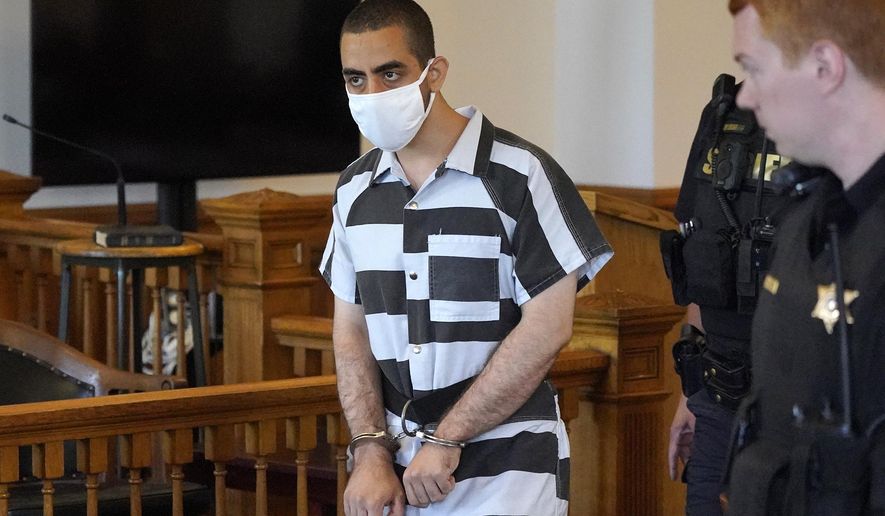Australia/Israel Review
How Iran gets away with murder
Aug 30, 2022 | Michael Rubin

On Aug. 12, Hadi Matar, a 24-year-old raised in the United States but loyal to Iranian Supreme Leader Ali Khamenei, stabbed author Salman Rushdie as he prepared to give a talk in western New York.
The Iranian Government both celebrated and denied responsibility. Kayhan, whose editor the supreme leader appoints, wrote, “A thousand bravos… to the brave and dutiful person who attacked the apostate and evil Salman Rushdie in New York… The hand of the man who tore the neck of God’s enemy must be kissed.” The Foreign Ministry, however, said, “We firmly and strictly deny any connection between the assailant and Iran.”
Such disavowals are disingenuous, but they work.
Consider what Iran has gotten away with by pleading that its terrorism was the work of rogue agents: In 1989, assassins gunned down Kurdish dissidents in Vienna. In 1992, it was Berlin’s turn. In 1992 and 1994, Iranian terrorists struck Israeli and Jewish targets in Buenos Aires. Two years later, an Iranian operation destroyed a US barracks in Saudi Arabia. Beginning in 2003, the Islamic Revolutionary Guard Corps (IRGC) and its proxy militias targeted Americans in Iraq, ultimately killing more than 600. In 2007, the IRGC began hijacking ships, seizing British and, in 2016, American sailors. IRGC tanker hijackings continue. In 2019, after Iran shot down a $176 million American drone, President Donald Trump eschewed retaliation.
“Somebody under the command of that country made a mistake. I think that it could have been somebody who was loose and stupid that did it,” he told reporters. Trump was wrong, just as are those in the Biden Administration who give Iran a free pass and dismiss Matar as a lone wolf. After each “rogue” action, the Supreme Leader rewarded or promoted the perpetrators. Why does Washington repeatedly fall for the “rogue” excuse?
For one, cultural blindness. To judge the Islamic Republic by American standards fails, as military command structure and culture differ. The US military is a strict hierarchy capped by the president as commander in chief. Ranks are well-defined, and orders and tasking flow down the chain of command.
Command structure and strategy evolved differently in Iran. Whereas the West has Machiavelli and Clausewitz, Iranians turn to writers from nearly a millennia ago who wrote their advice in a genre known as “mirrors for princes”. Rather than streamline command, Iranians duplicate it in order to force bureaucracies to compete against and inform on each other.
The same philosophy applies to terrorism: After the 2003 invasion of Iraq, analysts debated whether the Badr Corps or Jaysh al Mahdi were the pro-Iranian militia; the answer was both. Iranian patronage shifted back and forth to keep both in check. Likewise, in 2010, Kuwaiti security captured two Iranian terrorist cells, one answering to the IRGC Quds Force and the other to the Intelligence Ministry. Interrogations showed neither was aware of the other’s presence.
Just as important, Iran is a dictatorship unlike any other.
The supreme leader does not simply issue commands for the bureaucracy to follow but rather leads by veto. He issues guidelines about what underlings cannot do, leaving them with autonomy to do anything not expressly forbidden. Weekly sermons, delivered directly or by appointed substitutes, refine red lines. In practice, this means Iran’s mid-level officers have greater autonomy than their U.S. counterparts. But it also means there will rarely be a paper trail that offers a smoking gun of direct command culpability.
Iranian politics adds to the obfuscation. Whereas Biden sees Islamic Republic reformers as sincere, the reality is the “hard-liner v reformer” dichotomy is a game of good cop-bad cop posturing in which both camps act for the same theocratic control.
Together, this creates a system of plausible deniability in which Iran can attack its enemies without ever paying the price. As Iranian assassins roam from California to New York to Washington, the question for the White House is how long will it remain blind to the insincerity of Iran’s excuses and fail to recognise how the Iranian system really works.
Dr. Michael Rubin is a senior fellow specialising in the Middle East at the American Enterprise Institute. Reprinted from the Washington Examiner (washingtonexaminer.com). © Michael Rubin, reprinted by permission, all rights reserved.
Tags: IRGC, Iran, Islamic Extremism






